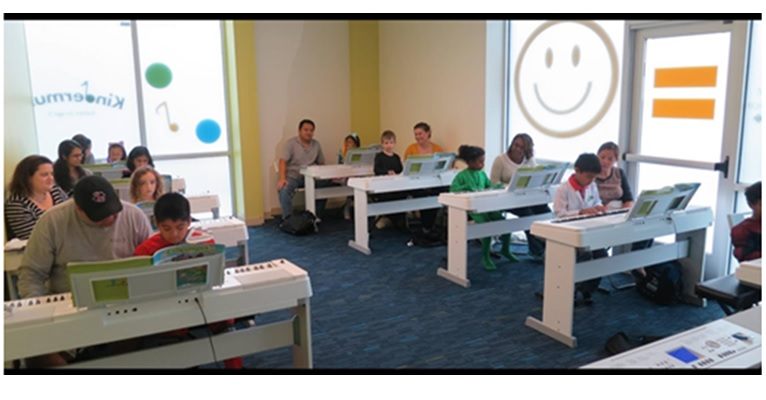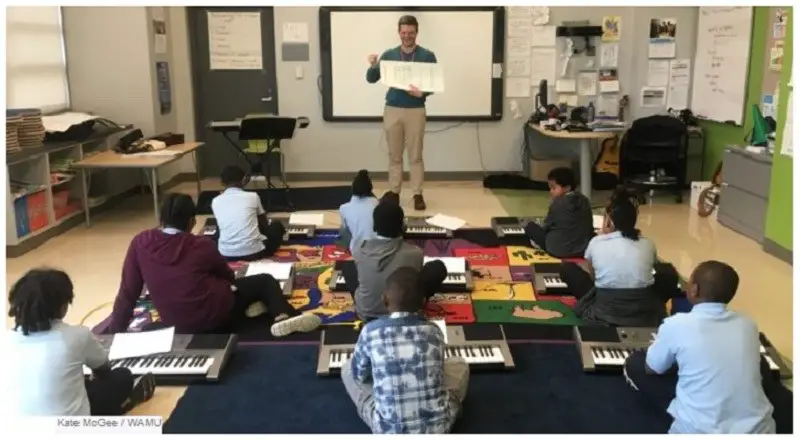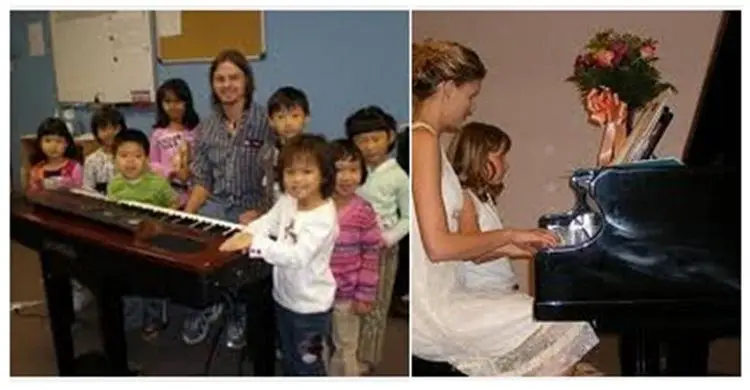
Should you take Group Piano Lessons or take private (one-to-one) lessons from a piano teacher? Taking private piano lessons or going in for group piano lessons are a couple of options for beginners who want to learn to play the piano. Here are the pros & cons of each.
Where to Find Piano Teachers
The piano, as opposed to any other instrument, sounds fantastic as standalone music instrument or even as part of a musical group. The intense sound of a piano is one that captivates audiences with strength or soothes them with tranquility.
It is always thrilling to enter the world of piano, be it as an absolute starter or as a refresher out there to brush up on forgotten skills.
Typically the most popular and common place to take beginner piano lessons would be the music department of a local high school or college university. In most instances, instructors there will also offer piano tutoring to non-students.
Students, on the other hand, will have a variety of choices within the music curriculum. Otherwise, a quick visit to a local specialty music store may provide leads on potential instructors.
When learning piano for beginners, it’s quite important that you choose the best instructor by assessing his/her experience, music educational background and any accomplishments, in case you are going in for a personal piano teacher. Obviously because their charges would be a lot more!
Probably the most commonly sought instructors will have some type of music degree or an equivalent amount of musical experience. A potential instructor regardless should be interviewed regarding their history in music, fee requirements, length of classes, policy on missed sessions, etc.
Benefits of Group Piano Lessons
Here are some of the benefits of Group Piano Lessons.
Less Pressure
The group setting reduces pressure on the new student. Presence of more students creates a more relaxed environment with less direct pressure on each learner. Students feel comfortable when they realize that there are many like him, who are starting from scratch.
Competition
Having several students in a class fosters healthy competition and motivate the students to do better. Often they will try to match or be better than the peers in the group.
Confidence
You get several opportunities to play for an audience (the size of the audience doesn’t matter). It also helps the student build self-confidence, besides also learning how to play with other members on a piece.
Teamwork
You become a better team member as you get to participate in various group activities such as playing a piece of one song, playing games, critiquing each other, and more. In a group setting, the members support each other’s learning.
Socializing
You get to meet new friends who share a common interest; you could end up working with some of them in a band or end up collaborating on a recording project.

Advantages of Private Piano Tuition
Private tutors are most suited for anyone with a hectic or unpredictable schedule. This is because a personal tutor will have a more flexible schedule and may be ready to work around that of the learner’s daily routine.
So if that’s what your schedule is like, go and find a piano teacher!
Group classes on the other hand are usually held at the same time on a certain days or nights, each week. A private tutor can be scheduled at any time during the day or evening without having to adhere to a fixed schedule. But then they also tend to be expensive.

Private vs Group Piano Teacher
Beginning Lessons for piano in most cases commences with an overview of reading and being familiar with fundamental concepts just like how to read musical notes, getting a grip on keys, and chords.
If your schedule is particularly going to be busy, you should consider using a private tutor as opposed to a music school. Music lessons offered to a class of students will be scheduled by the instructor, and will be less flexible toward each individual learner’s schedule.
This is not to suggest that group music lessons are not an excellent way to learn piano for beginners, because they are definitely useful and also helps to make some music friends. You may end up working together in a band or collaborate on some recording projects few years down the line.
Read: How much do music lessons cost?
Self Taught Piano Lessons
Perhaps the most fun way to learn the piano for beginners is to just start playing. Some of the world’s most famous musicians are self-taught, so don’t be afraid to go solo until you get comfortable with the keys and each of their unique sounds.
Professional instruction is undoubtedly one of the most appealing, but there is nothing wrong with a little practice before signing up for class. Better still, get a piano learning software or DVD course to learn piano on your own. Online courses offer beginners with the choice of learning piano right from your own home and at any time of the day or night.
Once you’re past the beginner stage, you may opt for Group Piano Lessons or find a piano teacher for private lessons, depending on your needs.
Jacintha is a singer and teacher, she takes piano and vocal lessons, sings for gigs, and also helps manage all the music requirements at her local church. Read more here.



DC Keys program, a piano learning program, is expanding in several D.C. elementary schools, teachers say its a confidence booster for students (who struggle in other areas). So is music a Key to early learning? Lets find out.
DC Keys, a partnership program with Washington Performing Arts, teaches elementary students the basics of playing the piano. The aim of the DC Keys program is to reinforce the music concepts, that the students are already learning, but on a piano so they have a more solid foundation of things.
As part of the program, all elementary students can learn music basics on their own keyboard. Its not an advanced learning program though (so students will not learn to play a Mozart piano sonata).
The student learn concepts like tempo and rhythm. They also learn a few basic songs and even compose their own music. Atkinson says without keyboards, he’d have to teach musical concepts with something called a boomwhacker, “which are these long tubes each of them corresponding to a pitch that you can tap against floor or wall and you can hear the pitch. Also singing and things like that, but definitely the piano makes it a million times easier.”
The idea of the program is to give students space to be creative so that school becomes more engaging. For students who might be behind in math or reading, which is common in struggling schools, learning a simple song on the piano and improving can be an important confidence booster.
One Teacher says music class is a place where students with behavior problems or issues with other students can focus on themselves. “In my class, my ears start to hurt because a lot of the time the kids are like not in their chair and talking a lot and I like silence. I’d be better deaf probably,” says Fourth grader Elliot Martin Reed.
Encouraged by the success of the pilot program, the District is now making it available at all elementary schools this year.
Our piano labs/studios have keyboards outfitted with a headset and microphone, this allows the instructors to use the lab for group instruction and practice, and also for individual work.
Usually in the first year of instruction, the students begin from very little to no experience with playing an instrument and go on to learn to correctly read notes and perform music (simple songs). The students then continue their study of music and of the piano and progress in their skill as music readers and performers.
Group Piano lessons are usually offered once or twice in a week, and lessons cost around $5 per lesson (which is often collected at the beginning of every month).
Lessons are available not just for kids, but also for adults as well as for junior high and high school students. While no previous musical knowledge is required in order to take lessons (be it group or private), those taking lessons are expected to practice at home and need access to a piano and a lesson book.
Those interested in lessons without access to an instrument also have a few options – they can use the practice rooms, or acquire an instrument at discounted prices or take it on a rent-to-own basis (its like buying on installments).
Those taking lessons are expected to attend every lesson. In case you are not attend a class for any reason, you may e provided a make-up lesson (but not many will be entertained). Additional make-up lessons could be charged an additional fee.